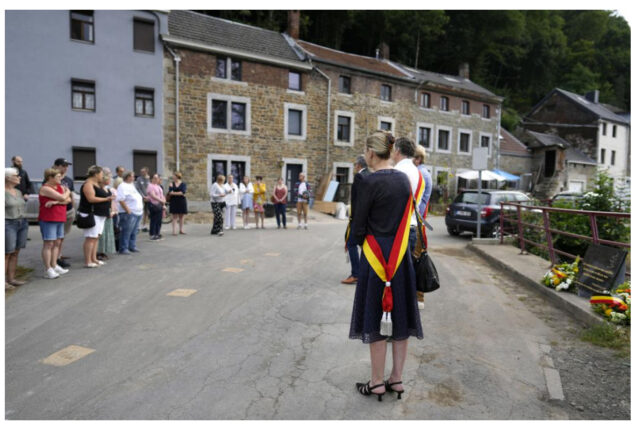Germans to travel the country in just €9, in response to soaring prices
Germans can travel the country for just €9, for the next three...

Germans demand change a year on from deadly floods
Germans paid tribute to more than 180 people killed in severe floods a year ago on Thursday, as those left behind complained that aid for reconstruction was slow to arrive.
President Frank-Walter Steinmeier went on a tour of the Ahr valley, while Chancellor Olaf Scholz joined a human chain and observed a minute’s silence in the hard-hit town of Bad Neuenahr-Ahrweiler.
In Bad Neuenahr-Ahrweiler, Cornelia Weigand, who was the mayor of nearby Altenahr at the time of the floods, told a sombre crowd that “the scale of the damage to body and soul” was “inconceivable”.
“Our mourning cannot be described with words,” she said, her voice wavering.
In Altenahr, Steinmeier said he wanted to “show that we haven’t forgotten the people of the Ahr valley” and “how many are still struggling to rebuild their homes”.
However, a year on from the disaster, frustration is building at the sluggish pace of help promised by the government.
Alfred Sebastian, the mayor of Dernau, said the town was “still at the very beginning” of the reconstruction process.
“We need to be financially supported by the state… We need it now. If not now, when? We have to move forward,” he said.
“Many of us are simply tired, exhausted and also disappointed about the fact that parts of the reconstruction… are only progressing slowly,” said Guido Orthen, the mayor of Bad Neuenahr-Ahrweiler.
Orthen also called on the government to “improve disaster prevention so that people no longer lose their lives in this way”.
Severe floods pummelled western Germany over two days in July last year, ripping through entire towns and villages and destroying bridges, roads, railways and swathes of housing.
Between 100 and 150 millimetres (four and six inches) of rain fell between July 14 and 15, according to the German weather service — an amount that would normally be seen over two months.
Forecasters had issued warnings, yet many residents were simply unaware of the risks of such violent flooding, with dozens found dead in their cellars.
With former chancellor Angela Merkel still in charge at the time of the floods, the government pledged a total of 30 billion euros ($30 billion) in federal and state aid to help with the reconstruction effort.
But in the state of Rhineland-Palatinate, only 500 million euros in aid has been handed out of the total 15 billion euros set aside.
In neighbouring North Rhine-Westphalia, 1.6 billion euros of government support has been approved for use, out of a total of 12.3 billion euros.
Rhineland-Palatinate state premier Malu Dreyer on Thursday told residents of Bad Neuenahr-Ahrweiler that their suffering had not been forgotten.
“I can assure you that we are working hard every day to ensure that the reconstruction succeeds for all and we take your concerns very seriously,” she said.
The disaster prompted criticism of Germany’s flood warning system and a criminal inquiry was opened into local officials for “negligent homicide”.
The government has since pledged to introduce phone alerts in the form of “cell broadcasting” and to reinstall sirens, many of which have been taken down in recent years.
It also raised concerns about climate change, with one international study showing that man-made global warming had made the floods up to nine times more likely.
A year on, Germany is set for more extreme weather with temperatures of up to 40 degrees Celsius (104 degrees Fahrenheit) expected this week as a heatwave sweeps across Europe.
King Philippe and Queen Mathilde attended a ceremony in Liege, Belgium, where 39 people were killed in the deluge.
Belgian Prime Minister Alexander De Croo praised the “heroes” who rushed to the victims’ aid, including a 14-year-old boy who threw himself into a river in an unsuccessful attempt to save another scout camp member.
Catch all the World News, Breaking News Event and Latest News Updates on The BOL News
Download The BOL News App to get the Daily News Update & Follow us on Google News.